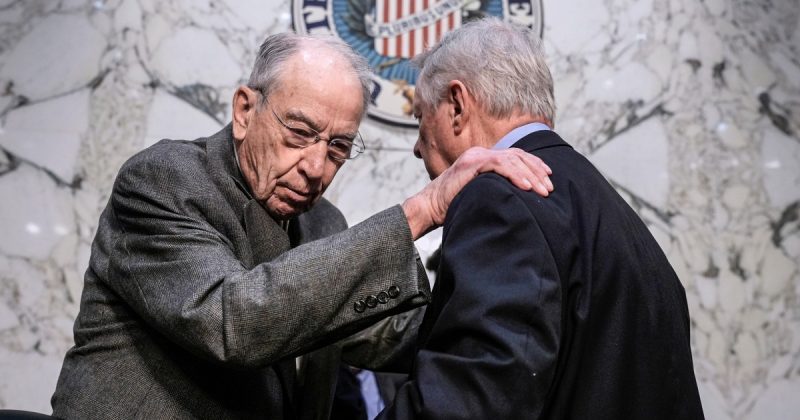
The fallout from President Trump’s latest round of aggressive tariffs is causing significant ripples in Washington. A growing number of Republicans are joining forces with Democrats in a concerted effort to curb the President’s power to impose these tariffs unilaterally. This bipartisan push represents a significant challenge to the President’s authority and highlights the increasing unease within Congress regarding the economic consequences of his trade policies.
Senator Chuck Grassley (R-Iowa) and Senator Maria Cantwell (D-Wash.) have introduced a bill designed to reassert Congress’s authority over tariffs, effectively placing restrictions on the President’s ability to levy them independently. Senator Thom Tillis (R-N.C.) has voiced his support for the bill, emphasizing the importance of maintaining the co-equal branches of government. While the bill’s future remains uncertain, its introduction signifies a growing bipartisan sentiment against the President’s tariffs.
This action follows a rare rebuke from four Senate Republicans who joined Democrats to pass a measure revoking tariffs on Canada. Senator Tim Kaine (D-Va.), the resolution’s author, believes this is just the beginning, hinting at further legislative efforts to block future tariffs and suggesting that more Republicans will join the cause as the economic impact becomes clearer.
The House of Representatives is also witnessing similar moves. Senior House Democrats are working towards passing a resolution mirroring the Senate’s action on Canadian tariffs. Facing resistance from House Speaker Mike Johnson (R-La.), who is reluctant to publicly oppose the President, Democrats are exploring alternative strategies. Representative Gregory Meeks (D-N.Y.) plans to file a discharge petition, a procedural maneuver that could force a vote on the legislation if enough signatures are secured. At least one moderate Republican has indicated potential support for this tactic.
The economic impact of these tariffs is undeniable. Major U.S. stock indexes experienced their worst one-day drops since the COVID-19 pandemic, with significant declines across the S&P 500, Nasdaq, and Dow Jones Industrial Average. Despite the market turmoil, President Trump remains unfazed, expressing unwavering optimism about the future of the economy.
Meanwhile, on the political front, Democrats are finding some cause for optimism in recent special elections. Analysis shows that Democrats have significantly improved their performance compared to the 2024 presidential election, exceeding expectations in multiple state legislative and congressional races. This improved performance, particularly in traditionally Republican strongholds, is injecting a much-needed dose of confidence into the Democratic party.
Beyond the tariff debate and election results, today’s political landscape includes various other noteworthy developments: the firing of National Security Council officials following a meeting with far-right activist Laura Loomer; a Pentagon investigation into Defense Secretary Pete Hegseth’s use of Signal for classified communications; the confirmation of Dr. Mehmet Oz to head the Centers for Medicare and Medicaid Services; New York City Mayor Eric Adams’s decision to run for reelection as an independent; Representative Chris Pappas’s Senate candidacy in New Hampshire; and the anticipated continuation of the White House Easter Egg Roll, despite concerns over egg prices. The political scene remains dynamic and full of significant events.









